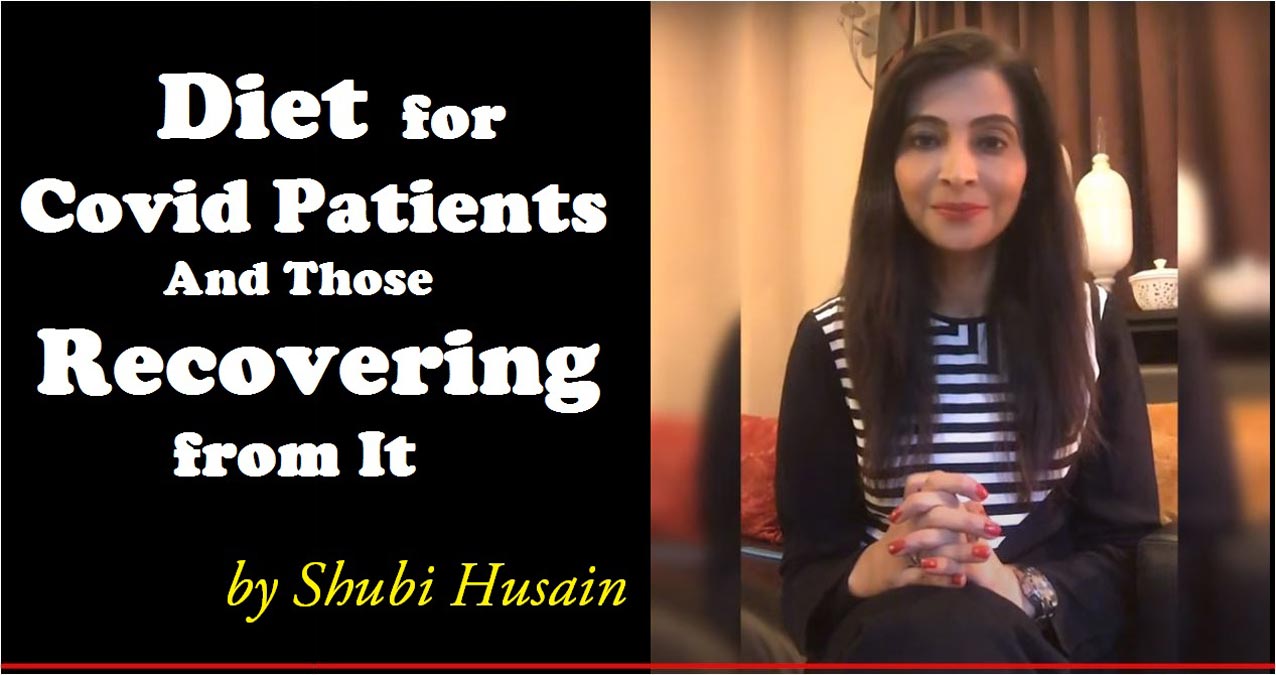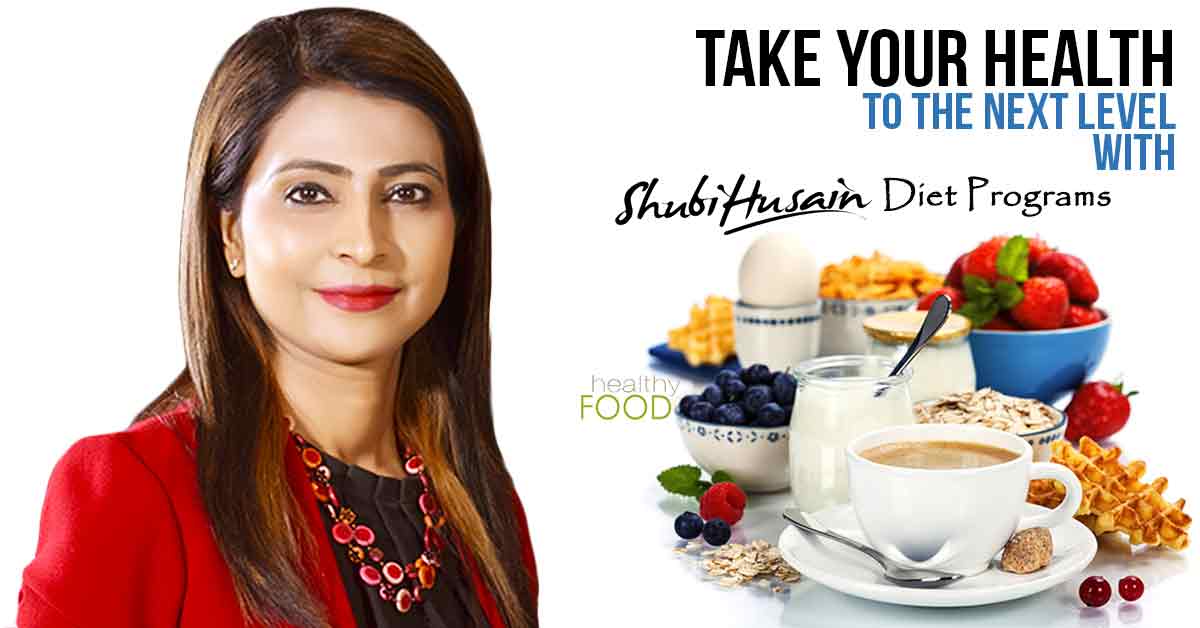SHUBI HUSAIN CLEARS SOME FOOD & NUTRITION RELATED MYTHS
Posted By: Simran On: February 17th, 2016

We ask Shubi Husain about some Food & Nutrition myths and the reasons thereto
Q1. Do you believe that carbs are bad for the body?
Carbs aren’t bad for you. Choosing the right carb is important. There are two types of carbs, Good carbs and Bad carbs. Bad carbs or simple carbs are easiest to digest and breakdown, therefore they tend to provide quick, short lived bursts of energy. Also since they are easy to digest, you often feel hungrier more quickly. This type can be found in foods such as cakes, candies, white breads and other food containing refined sugars.
Good carbs or complex carbs are difficult for the body to breakdown and therefore keep you feeling fuller longer. They are found in high fibre foods like fruits, vegetables and whole grain.
Eating carbs provides body with much needed energy. However, overindulging on them can have negative side effects such as weight gain and development of type -2 diabetes.
Q2.Are you of the opinion that water diet work?
If you are a healthy person, a few days of fasting probably won’t hurt you but it’s bad way to lose weight. When your main (or only) intake is water your body loses crucial nutrients it needs. The short term result is that you lose a lot of weight, most of which is water not fat. However, the built up hunger can lead to binging and weight regain. Without proper nourishment your hunger will grow so much that most people tend to revert back to their normal eating patterns, regaining the weight that they lost initially.
Q3.Do you believe that calories consumed at night are more fattening than those consumed during the day?
Calorie is a calorie, no matter what time of the day you consume it.
Q4. Should we have dinner before 7.30pm.
A heavy and late dinner is not just a bad practice, but detrimental to health. Dinner should be eaten early to maximize weight loss because people are less active in the evening, meaning extra calories are more likely to turn to fat. Also eating too close to bedtime increases your blood sugar and insulin, which make it harder to sleep. Your last meal should be the lightest meal of the day and should be eaten at least three hours before you go to sleep.
Q5. Is microwave food bad for you?
Microwave cooking and heating does not change the components of your food, it only heats the food. There is no evidence of toxin formation in food or carcinogens. If you over cook your food, then you are changing the components of the nutrients in your food. There is no microwave health risk unless it’s carelessness on your part. Be wise, use the right containers, avoid cling film from touching the foods and maintain your microwave regularly.
Q6. Do you believe that fasting periodically, helps in permanent weightloss?
Fasting periodically helps in weight loss. In my opinion a lifestyle change is the only way to stay healthy and maintain a healthy weight permanently.
Q7. Is meat bad for you?
Diet high in meat is not good for your health. High level of animal protein can be bad for your health. Red meat and processed meat should be restricted and only limited amount of white meat should be included in the diet.
Q8.If we eat food or drink water immediately after a workout, will it ruin our weight loss process?
Eating food or drinking water immediately after a workout won’t ruin your weight loss process. The ideal pre and post diet chart should be planned, taking in consideration your individual needs, weight and goals.
Q9.Do fast eaters gain more weight than slow eaters?
People who eat fast tend to be heavier and gain more weight over time compared to slower eaters. Eating slowly helps you eat less. Your appetite and calorie intake is largely controlled by hormones. Eating slow can increase satiety and eating fast often leads to overeating, as your brain doesn’t have the time it needs to receive the fullness signals. Additionally eating slowly has been shown to decrease the amount of food consumed at a meal.
Q10. Are the effects of Diet soda any different than those of the normal soda?
Diet soda is simply the same as regular soda. The only difference is that they have different type of sweetener in the ingredients. In regular soda drinks, the beverage is sweetened using ordinary sugar (i.e. corn syrup, which is high in fructose) but in case of diet soda this ingredient has been omitted from the mix and replaced by another type of artificial sweetener commonly known as aspartame. However, many studies today contest that the addition of aspartame does not make the drink any healthier than regular soda and also doesn’t give guarantee for losing weight.
3 thoughts on “SHUBI HUSAIN CLEARS SOME FOOD & NUTRITION RELATED MYTHS”
Leave a Reply
benefits of bananas Benefits of Garlic Bollywood celebrity Cholesterol Lowering Diet Complete food Diet for High BP Diet Myths diet tips Dietician eating before workout Eating garlic Essential Nutrients exercise Family Nutritionist Fitness Quotient Fitness Tips Foods Foods for dinner Foods for weightloss Fortified table salt Fourth getting in shape Health benefits of Spinach health foods Health Sanctuary Health Sanctuary Reviews HEALTH TRENDS healthy eating healthy eating during pregnancy Healthy Food Hollywood Hypertension Diet Plan Iodine deficiency Nutrition nutrition tips nutritionist olympics Portfolio Diet Positive Thinking Pregnancy diet tips pregnancy eating Shubi Husain Shubi Husain Diet Plan Slimming Spinach Tata salt weight loss Weight loss Review Weight Loss Testimonial World Health Day
-
Top 10 Tips To Overcome Fatigue And Remain Energetic Through The Day
Read more
-
Food That Will Help You Have Sharp and Good Memory
Read more
-
Diet Plan For Covid Patients & Those Recovering.. by Shubi Husain
Read more
-
Top 9 Foods To Boost Your Immunity Against Covid-19
Read more
-
How To Create A Kitchen Garden With Top 10 Healthy Herbs
Read more







I am truly grateful to the owner of this website who has shared
this great piece of writing at here.
My brother suggested I would possibly like this website.
He used to be entirely right. This put up actually made my day.
You can not imagine just how a lot time I had spent for this
information! Thank you!
Thank you so much Shubi Husain mam for clearing many of my doubts and myths that i had since my childhood.